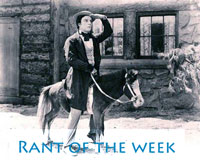
An earlier incarnation of Molly Ringwald: Shirley MacLaine.
The 1954 movie "Some Came Running" was based on a book by James Jones.
At the end of the book. the hero, Dave Hirsh, is killed by a mobster trying
to take down his former girlfriend, Ginnie.
Frank Sinatra, that literary
genius, insisted that his character could not be killed at the end-- no,
no-- it would be better if Ginnie was killed. Better yet-- Ginnie is
killed while trying to save Dave. She jumps in front of the bullets.
Yeah, yeah, that's it. He famously quipped-- "Let the girl take
the shot -- it'll probably win her an Oscar." It did.
Geez, Frank, did you ever win a Pulitzer? You should have.
You had all of one idea, and it was a bad one, but it made the final cut.
My question is: did they deduct money from James Jones' check-- why did they
even need him? Give Frank a typewriter and have him write the entire
movie-- he can do it. He's a genius.
At the end of "Pretty in Pink", Andie (Molly Ringwald) forsakes the rich kid,
Blane, and finally reciprocates Duckie's long, anguished crush.
No she didn't. That is what John Hughes wanted originally.
The alternative was, according to IMDB: "forced upon him by the
studio...". Andie goes with Blane. This was complicated
and required the actors to be flown back to location and refilmed.
In this excruciating scene-- "I always believed in you. You just
didn't believe in me..." (Blane) gratifies the ambiguous feelings Americans
have towards wealth. They want to hate the rich. Then they want
to be the rich. Then they want to hate the rich. That
whacky Ron "Duckie" Paul had a crush on her but in the end, she's got to go
with Mitt Romney. And Duckie must be forced to be party to his own
emasculation. But then, Kristy Swanson smiles that intoxicating,
unnerving, mesmerizing smile and it's almost worth it.
Another trivia item contradicts the claim that the studio was the
culprit: it says that director/writer John Hughes didn't want to imply
that poor kids couldn't make it with rich kids. He didn't want to
leave you with the idea the class matters. As if it didn't.
Another note mentions that test audiences wanted Andie to end up
with Blane.
Test audiences?
I have a solution for that problem. Let's round up a test audience,
give them a notebook, a camera and a microphone and a recorder and some
lights and make-up, and tell them to go make a film. They can make the
exact film they want. Then they can watch it over and over and over
and over and over and over and over again. See how they like it.
It doesn't make any sense. If movie producers need a test audience
to tell them how to end a movie, why not have them create the story as well?
Well, I guess they kind of do.
Test audiences would never have approved of the ending of "The Graduate",
the most original and compelling minute of the movie. They would have
had Ben and Elaine laugh, kiss, and "Feelin' Groovy" would have played in
the background.


